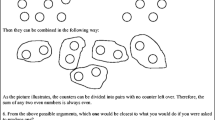Abstract
In this paper, we report a study in which nine research mathematicians were interviewed with regard to the goals guiding their reading of published proofs and the type of reasoning they use to reach these goals. Using the data from this study as well as data from a separate study (Weber, Journal for Research in Mathematics Education 39:431–459, 2008) and the philosophical literature on mathematical proof, we identify three general strategies that mathematicians employ when reading proofs: appealing to the authority of other mathematicians who read the proof, line-by-line reading, and modular reading. We argue that non-deductive reasoning plays an important role in each of these three strategies.
Similar content being viewed by others
Notes
This refers to phase V of Boero’s (1999) six phases of conjecturing and proving.
References
Alcock, L., & Weber, K. (2005). Proof validation in real analysis: Inferring and evaluating warrants. Journal of Mathematical Behavior, 24(2), 125–134.
Arzarello, F. (2007). The proof in the 20th century: From Hilbert to automatic theorem proving. In P. Boero (Ed.), Theorems in schools: From history, epistemology, and cognition to classroom practice. Rotterdam: Sense Publishers.
Balacheff, N. (2002). The researcher epistemology: A deadlock from educational research on proof. In F. L. Lin (Ed.), 2002 International conference on mathematics education- understanding proving and proving to understand. Taipei: NCS and NUST.
Boero, P. (1999). Argumentation and mathematical proof: A complex, productive, unavoidable relationship in mathematics and mathematics education. International Newsletter on the Teaching and Learning of Mathematical Proof. Retrieved August 2, 2010, from http://www.lettredelapreuve.it/OldPreuve/Newsletter/990708Theme/990708ThemeUK.html
Davis, P. (1972). Fidelity in mathematical discourse: Is one and one really two? American Mathematical Monthly, 79, 252–263.
De Milo, R., Liptus, A., & Perlis, A. (1979). Social processes and proofs of theorems and programs. Communications of the ACM, 22, 271–280.
de Villiers, M. D. (1990). The role and function of proof in mathematics. Pythagoras, 24, 17–24.
Duval, R. (2007). Cognitive functioning and the understanding of the mathematical processes of proof. In P. Boero (Ed.), Theorems in schools: From history, epistemology, and cognition to classroom practice. Rotterdam: Sense Publishers.
Fischbein, E. (1982). Intuition and proof. For the Learning of Mathematics, 3(2), 9–18.
Hanna, G. (1991). Mathematical proof. In D. Tall (Ed.), Advanced mathematical thinking. Dordrecht: Kluwer.
Hanna, G., & Barbeau, E. (2008). Proofs as bearers of mathematical knowledge. ZDM, 40, 345–353.
Harel, G. (2001). The development of mathematical induction as a proof scheme: A model for DNR-based instruction. In S. Campbell & R. Zazkis (Eds.), Learning and teaching number theory. New Jersey: Ablex Publishing Company.
Harel, G., & Sowder, L. (1998). Students proof schemes. Research in Collegiate Mathematics Education, 3, 234–282.
Harel, G., & Sowder, L. (2007). Towards a comprehensive perspective on proof. In F. Lester (Ed.), Second handbook of research on mathematical teaching and learning. Washington, DC: NCTM.
Healy, L., & Hoyles, C. (2000). A study of proof conceptions in algebra. Journal for Research in Mathematics Education, 31, 396–428.
Inglis, M., & Mejia-Ramos, J. P. (2009). The effect of authority on the persuasiveness of mathematical arguments. Cognition and Instruction, 27, 25–50.
Inglis, M., Mejia-Ramos, J. P., & Simpson, A. (2007). Modelling mathematical argumentation: The importance of qualification. Educational Studies in Mathematics, 66, 3–21.
Jackson, A. (2006). Conjectures no more? Consensus forming on the proof of the Poincare and geometrization conjectures. Notices of the American Mathematical Society, 53, 897–901.
Konoir, J. (1993). Research into the construction of mathematical texts. Educational Studies in Mathematics, 24, 251–256.
Kreisel, G. (1985). Mathematical logic: Tool and object lesson for science. Synthese, 62, 139–151.
Lampert, M. (1990). When the problem is not the question and the solution is not the answer: Mathematical knowing and teaching. American Education Research Journal, 27, 29–63.
Maher, C., Muter, E., & Kiczek, G. (2007). The development of proof making by students. In P. Boero (Ed.), Theorems in schools. Rotterdam: Sense Publishers.
Manin, Y. (1977). A course in mathematical logic. New York: Springer Verlag.
Martin, W. G., & Harel, G. (1989). Proof frames of pre-service elementary teachers. Journal for Research in Mathematics Education, 20(1), 41–51.
Mejia-Ramos, J.P. (2008). The construction and evaluation of arguments in undergraduate mathematics: A theoretical and a longitudinal multiple-case study. Unpublished Ph.D. dissertation. University of Warwick, U.K.
Otte, M. (1994). Mathematical knowledge and the problem of proof. Educational Studies in Mathematics, 26, 299–321.
RAND Mathematics Study Panel. (2003). Mathematical proficiency for all students: Toward a strategic research and development program in mathematics education. Santa Monica: RAND corporation.
Rav, Y. (1999). Why do we prove theorems? Philosophia Mathematica, 7, 5–41.
Selden, A., & Selden, J. (2003). Validations of proofs written as texts: Can undergraduates tell whether an argument proves a theorem? Journal for Research in Mathematics Education, 36(1), 4–36.
Stylianides, A. & Stylianides, G. (2008). Enhancing undergraduates students’ understanding of proof. In Proceedings of the 11th Conference for Research in Undergraduate Mathematics Education. Last downloaded March 18, 2009: http://www.rume.org/crume2008/Stylianides_LONG(21).pdf.
Thurston, W. P. (1994). On proof and progress in mathematics. Bulletin of the American Mathematical Society, 30, 161–177.
Weber, K. (2008). How mathematicians determine if an argument is a valid proof. Journal for Research in Mathematics Education, 39, 431–459.
Acknowledgments
The research in this paper was supported by a grant from the National Science Foundation (NSF #DRL0643734). The views expressed here are not necessarily those of the National Science Foundation. We would like to thank Sean Larsen for helpful insights on developing our theoretical model, as well as the anonymous reviewers for their comments on earlier drafts of this manuscript.
Author information
Authors and Affiliations
Corresponding author
Rights and permissions
About this article
Cite this article
Weber, K., Mejia-Ramos, J.P. Why and how mathematicians read proofs: an exploratory study. Educ Stud Math 76, 329–344 (2011). https://doi.org/10.1007/s10649-010-9292-z
Published:
Issue Date:
DOI: https://doi.org/10.1007/s10649-010-9292-z




